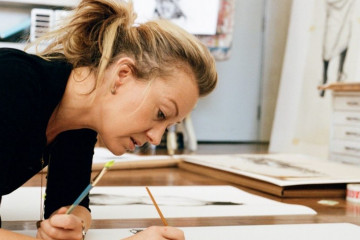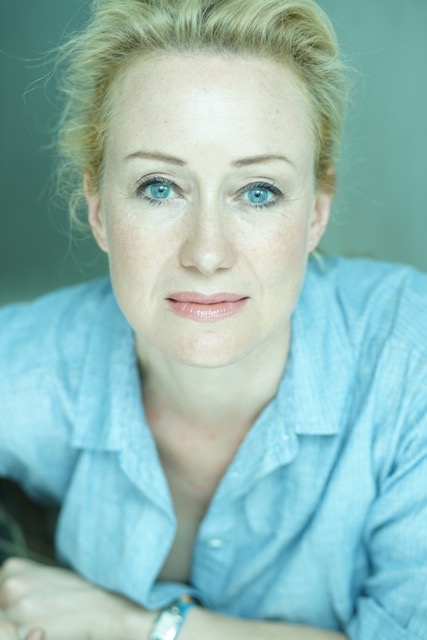

Powerful charcoal nudes drew attention to gender violence at an exhibition by artist, playwright and actress Lorien Haynes which was launched in two London venues on International Women’s Day.
“The exhibition is called Pieces of a Woman because I build the women from pieces of paper,” Haynes explained. “I start drawing the body and the torso and the solar plexus and the spine and then I extend the body over other pieces of paper so the head grows in one direction, the feet go in another and the arm might go in another. So it becomes a collage which I paste together.”
In addition to the 23 oversized charcoals, Haynes included 15 hand-coloured prints in the exhibition. Each piece is named after a strong woman who has influenced or supported her in some way, but the subject is not named in nude form as this could be very uncomfortable for her.
"Every time an economic or humanitarian disaster hits us women bare the heaviest burden... During lockdown 16 million women world wide have been exposed to violence in their own homes"
The motivation for Haynes is to draw women how she sees them in front of her.
“We are used to seeing how women are perceived in popular media, advertising and the press. I am trying to draw the female body as a landscape as I see it in front of me rather than objectifying it or filtering it through a lens of aesthetics or what is seen to be aesthetically beautiful,” Haynes said.
“What I have learned from drawing women and looking at the female body is that someone’s beauty and a sense of self comes from inside and I can see that coming out of the female form. Everybody’s energy is different which is what makes people magical.”
The first exhibition launch was at New Bond Street’s Koppel Project in central London where the exhibition was unveiled and featured a performance from Miss Yankey, a British/Ghanaian writer and a spoken word artist.
After two days the exhibition moved for four days to Burgh House, a historic house/museum in North West London. Both launches were organised by Hampstead-based Zebra One Gallery.
A percentage of proceeds from these two VIP events will benefit the charities Refuge, which supports domestic abuse survivors, and The Circle, Annie Lennox’s global NPO which champions women’s rights.
As a passionate feminist and survivor of sexual abuse, Haynes is eager to use her artistic talents to support and empower victims of violence. “Most women I know are survivors of some form of sexual violence, so it feels crucial at this time – when during the pandemic, sexual and domestic violence figures have risen exponentially – to draw attention to the issue and donate a percentage of every piece sold,” Haynes said.
The launch at Burgh House began with a message from a spokesperson for The Circle. “As artists, we are saying we can make a difference with our writing, our art, our performances and we become activists. Focusing on the most vulnerable women and girls, particularly in the Global South, and our thoughts are with everybody in Ukraine.
"We are funding grassroots organizations which are brilliant and extraordinary. They are on the frontline supporting women and survivors of domestic and gender-based violence. They are empowering them to go out and get jobs. In the UK we are supporting Sikh Women’s Aid which is assisting women in the South Asian community who have suffered violence. We do lots of advocacy because we want to see long term change," Haynes added.
The Circle is supporting the Marie Colvin Journalists’ Network (MCJN). This network brings together more than 250 female journalists from across the MENA region, including experienced journalists and up-and-coming reporters, to share advice and support each other.
Sunday Times journalist the late Marie Colvin was a passionate advocate of women’s right to speak out and influence change and took every opportunity to mentor and offer advice to less experienced journalists.
After her death in Homs, Syria, in February 2012, her friends set up the network. Depending on the need and available resources, MCJN offers mentoring, psychological support, training opportunities and digital resources in Arabic and English on a range of journalistic topics.
“Journalists in the Middle East and North Africa, especially those living and working in conflict zones, face many risks, including violence, threats and kidnapping,” MCJN said in a statement.
“They are at the front line, reporting stories of global importance from some of the most dangerous places in the world. Female journalists suffer sexual assault, threats and abuse more often than men. Local female journalists are the most vulnerable, as they cannot leave the scene and have to stay to live with the consequences of violence.”
Addressing the launch via Zoom the founder of The Circle Annie Lennox said: “We have much to do to end the global pandemic of gender-based violence. The WHO estimates that one in three women around the world will face physical or sexual violence in their lifetime.
"Since the COVID pandemic, women’s rights have been rolled back an entire generation. Every time an economic or humanitarian disaster hits us women bear the heaviest burden. In poorer countries, girls have been pulled out of school. During the lockdown, 16 million women worldwide have been exposed to violence in their own homes.
"We are calling on world leaders to expose the scale and nature of violence against women everywhere and work together in taking urgent steps to end it, especially for more than 603 million women who live in countries where domestic violence against women is not even considered a crime.
"We must campaign and call for a fundamental change, a seismic shift and we must bring our male allies on board as the fight for equality will never be won without them. Until we appreciate that this issue spans the world we are never going to fully understand how gender inequality impacts women’s rights and we are never going to be able to change this,” Annie concluded.
The launch in Burgh House also featured readings from the cast of the West End play Punched co-written by Haynes which was inspired by the “shadow pandemic” of domestic abuse and violence during the COVID-19 lockdown. The première of She Came to Me a short film written by Haynes and directed by Saffron Burrows about a South African rape crisis centre was also screened.
A Burgh House spokesperson said: “We are proud supporters of female artists, with a strong presence of women’s art in our collection. And we are passionate about amplifying the voices of those that might not be heard. “So we are proud to be working with The Circle, Refuge, Haynes and Zebra One on this important campaign.”
Lorien Haynes has had five solo Los Angeles shows and her work has been exhibited by London galleries including The Haymarket and bought at auction by Saatchi Gallery, which also selected her as one of their Female Artists to Watch.
Karen Dabrowska is a London-based freelance journalist focusing on the Middle East and Islamic Affairs. She is also the author of ten books. Her latest, biography, Mohamed Makiya: A Modern Architect Renewing Islamic Tradition was published by Al-Saqi in July








 Follow the Middle East's top stories in English at The New Arab on Google News
Follow the Middle East's top stories in English at The New Arab on Google News


